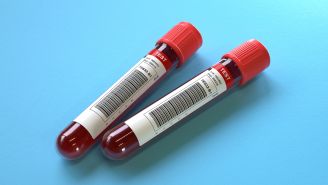Updated on March 15, 2024.
Measles isn’t just a rash. It’s not a childhood rite of passage, either. It’s a highly contagious respiratory disease caused by the rubeola virus. The infection is dangerous. For some people, it could even be deadly.
Before the measles vaccine was introduced in 1963, it’s estimated that three to four million people in the United States got measles every year. Of these people, 48,000 were hospitalized and up to 500—mostly otherwise healthy children—died. By 2000, measles was essentially eliminated from the United States, thanks to the success of the U.S. vaccination program.
Measles, however, is making a comeback as a growing number of people in the U.S. and around the world are delaying vaccinations or choosing not to vaccinate their children. Some have religious or cultural reasons for their decision. The COVID pandemic also played a role, temporarily disrupting routine preventative care for millions of people.
Others have chosen not to vaccinate against measles because they believe the disease is less risky than its vaccine. This is not true. In fact, it goes against decades of scientific evidence, which shows the MMR (measles, mumps, rubella) vaccine is not only very safe, but highly effective.
The MMR vaccine (and all others given to adults and children in the U.S.) has been tested exhaustively for safety and effectiveness. The most common side effects from the vaccine include mild rash, fever, or temporary discomfort in the arm where the shot was given. (Nope, the MMR vaccine doesn’t cause autism.)
But what could happen if you or someone you love got measles? Here’s what you should know.
Measles early signs and symptoms
Seven to 14 days after exposure, an infected person will develop a fever and fatigue. Before long, they will start to cough and get a runny nose. They may also have conjunctivitis, also known as pinkeye.
About two days after these symptoms appear, tiny white spots, called Koplik spots, may form inside their mouth. Three to five days after symptoms begin, patients will break out in the characteristic red measles rash. First, it will appear on their face before spreading down to their chest, arms, legs and feet. At this point, their fever may spike to more than 104 degrees Fahrenheit.
That’s the best-case scenario.
Risk for other infections
For about 30 percent of people, measles leads to complications, according to Daniel Kaswan, MD an infectious disease specialist affiliated with Aventura Hospital and Medical Center in Aventura, Florida. “That’s a high rate,” he points out.
Kids younger than 5-years old, adults older than 20-years old, pregnant women and those with weakened immune systems are at greater risk for measles-related problems.
About 8 percent of those with measles develop diarrhea, and roughly one in 10 kids with the disease will get a secondary ear infection.
People with measles are also at risk for pneumonia. About one out of every 20 kids with measles develops this serious lung infection. It’s the most common cause of death among young children with measles.
“Bacterial infection is a common complication because measles can lead to some suppression of the immune system,” Dr. Kaswan explains.
A weakened immune response makes it harder for the body to fend off germs. “So, people, particularly children, can develop ear infections and also severe respiratory tract infections, which can be deadly,” he adds.
More serious measles complications
Young children who get measles may develop viral croup, a condition that causes the airway to swell and become narrow, making it difficult to breathe. Kids with croup tend to develop a barky cough, a hoarse voice and noisy breathing. Those with severe symptoms may need to be hospitalized.
Measles can also cause encephalitis, or inflammation of the brain. Roughly one in every 1,000 people who gets measles will develop this condition, which can lead to convulsions, deafness, or permanent brain damage.
Pregnant women who get measles are also at greater risk for premature delivery, having a low-birth weight baby and miscarriage.
Very rarely, measles can lead to an incurable, progressive neurological condition called subacute sclerosing panencephalitis (SSPE). Those who’ve had measles, particularly young children who were infected before the age of 2, can develop this condition seven to 10 years later—long after they’ve seemingly recovered from the virus.
People with SSPE may initially experience irritability, trouble sleeping, and forgetfulness before developing muscle jerks and seizures. Eventually, those with SSPE may go blind and lose the ability to swallow and speak. The condition impairs the brain’s ability to control the autonomic nervous system, which regulates vital bodily functions, such as blood pressure, digestion, and breathing. It’s usually fatal.
Measles doesn’t “build up” the immune system
Some people assume fighting measles would help strengthen their immune system. Research suggests the virus could actually have the opposite effect, weakening the body’s defense system by triggering “immune amnesia.”
A 2019 study published in Science found measles effectively erases the immune system’s memory of many other infections it’s already defended against, leaving people vulnerable to these germs all over again.
A team of researchers, led by scientists at Harvard, found that measles wipes out 11 to 73 percent of the antibodies people have already produced in response to a range of infections, including flu, herpes, and pneumonia. The immune system can eventually rebuild its defenses, enabling people to regain their immunity to germs as they’re re-exposed to them. But this takes time—months or even years, the study’s authors caution.
How to protect yourself and others
Roughly one out of four people with measles will need to be hospitalized. And even with the best care, one or two out of 1000 people with the disease will die.
Meanwhile, one dose of the MMR vaccine is 93 percent effective against the rubeola virus. Receiving the recommended second dose of the vaccine boosts your protection to about 97 percent. For the vast majority of people, this protection is lifelong.
“The point is that measles is totally preventable,” Kaswan says. “So why expose yourself to any of this?”
The more people who go unvaccinated, the more likely it is that measles will spread. The rubeola virus, which lives in the nose and throat mucus of those with the disease, can spread through the air when they cough or sneeze. It can linger and live in the air or on surfaces for up to two hours. So, anyone who touches an infected surface before touching their eyes, nose, or mouth can become infected.
The disease is so contagious that up to 90 percent of people exposed to the virus will get it—if they are unvaccinated. People infected with measles can spread the disease to others for up to four days before they develop symptoms and for up to four days after the characteristic red rash appears.
Unvaccinated people who are exposed to the virus should call their doctor and make special arrangements to get the MMR vaccine within 72 hours, advises Kaswan. “They should contact their primary care doctor as soon as they can,” he says. “If there is a known outbreak of measles in their area, they can also try to call their local health officials for instructions.”
Anyone with measles should stay home and avoid places—particularly schools, airports, hospitals, and daycare centers—where those most vulnerable to the disease and its complications are likely to be found in high numbers. It’s important for infected people to remain at home until their doctor says it’s safe for them to return to public spaces and resume their normal daily routines.
About three out of 100 people who are fully vaccinated against measles will still get the virus if they are exposed. It’s unclear why this happens. It may be that their immune system simply doesn’t respond as well to the vaccine.
Experts point out however that vaccination still has benefits for this small group of people. If they are immunized, they are much more likely to have a milder form of the disease and less likely to spread the infection to others who may be too young to be vaccinated or have weakened immune systems.
If you aren’t sure that you’ve received two doses of the MMR vaccine and don’t know if you’ve ever had measles, talk to your healthcare provider (HCP). This is particularly important if you were immunized before 1968. You may also want to talk to your HCP if you were vaccinated between 1968 and 1989, particularly if you’re a college student, healthcare personnel, or international traveler.
There are labs tests that can determine if you’re immune to the disease. Keep in mind, this testing may cost more and take more time than simply getting vaccinated. Even if you’re already immune, there is no harm in getting another dose of the vaccine.
By getting the shot, you can drastically reduce the chances that you, someone you love, or members of your community will become infected.







